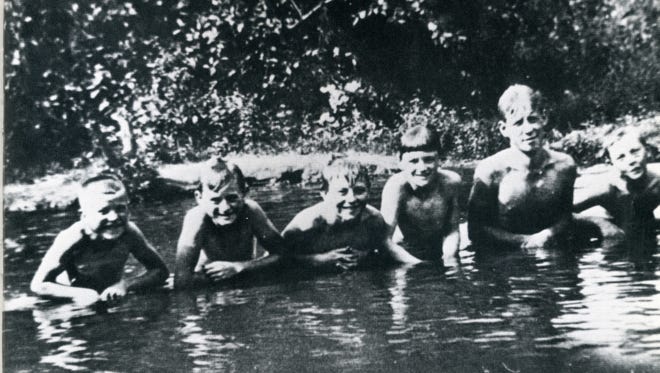For farm boys, the cold trout stream served as the sure cure for hay-making
 Colleen Kottke
Colleen Kottke
“Naked as a heathen.”
My grandmother’s oft used expression, an utterance she used to describe all manner of falling from grace, be it politics, or the newlywed wife who couldn’t as they used to say, “boil water.” These the circumstances my grandmother described as “naked as a heathen.” A convenient synonym for the witless, those without tools, or a sewing machine, also the clueless, if also occasionally those whose political views were cross-threaded.
Her expression to describe and diagnose was in our youth used on habits she believed at variance to her civilizational norm. Did I mention she resorted to this expression regularly?
Down-the-road from our farm was a neighbor lady who secretly held a CIA operative license. It seems she had again seen us bathing in the natural state of undress at the road bridge that was then a rudimentary kind of two inch oak plank. That we, by tilting the two center planks to each side, gained a reasonable orifice, thus to leap through and land in the fast water below that because of the concrete bridgeheads formed a deep channel what we believed – as only farm creatures can – was the only true cure for a day, a week, a month of haying.
The cure was as I remember – instantaneous.
This the neighbor lady (the ex-CIA spy) reported in detail to our grandmother. Long before trail cameras were installed darn everywhere as can also forestall a fair and honest native expression – hay cure.
We never did figure out how in the blazes she knew the instant we shed our clothes and hung them, neat enough for farm boys, on the bridge rail. The only time it was safe to go to the bridge for a dip was after dark which, of course, we did.
The fact remains the really great and perfect cure of haying is more immediate. Haying in its ideal state is a stretch of altogether unrelenting hot weather to the consequence we were soon after shucked of the chore. Which isn’t to say we were played out, just damned chafe-infected. We stuck to our shirts, our jeans seemed painted on, we could hardly peel our socks off. Every article of clothing stuck to us as if by epoxy.
What pilgrim child cannot know the need for a cure, recognize the utter deliverance of that last load of hay crossing over that plank bridge. There is no power of prayer like that of a hay-day cure in true trout water.
We are not talking pond water warm, but genuine brook trout water that has just eked from beneath the ice-haunted moraine, waters as cold as if emerging from the continental ice-sheet. Waters so cold the chill tensile of them rang against the bridgehead like so many toasting champagne flutes. That same certain octave is trout water.
There was no like to this hay-making cure. It was rumored the Catholics of Polonia had ice-cold taverns as to torture a Methodist soul. At least at hay time. What we had was the original, Garden of Eden hay-making cure. No wimpy Chain-of-Lakes water mild as a tub bath, no kitchen sink warm Sunset Lake, that later was to host naked hippy acts that were also known to be curative.
None so immediate as our plank bridge cure. That plank bridge just down the road, a distance a Schwinn could traverse in minutes. For a cure for hay-making you could feel to your soul.
Somehow, all this, the neighbor lady knew. I swear we heard the click of her Brownie camera. Happily it didn’t come with a telephoto lens.
In the brief instant between jumping through the empty gap on the bridge and emerging downstream a few seconds later, all haymaking sins were forgiven. We emerging that water baptized as only glacial ice can. The whole treacherous, soul-melting week of hay making was forgotten.
Our bones rang of their newness, suddenly I found myself actually looking forward to unloading that last hay load into a haymow still sweltering at the same exact surface temperature as Venus.
To admit, we should have put on our clothes for the ride home on top of the hay wagon because the phone was ringing before we reached the driveway. Shortly after, our grandmother emerged from the house with that determined look on her face, it seems, she said, we were seen. The hint was possibly recorded, naked as a heathen.
With this damning message delivered our grandmother turned on her very Christian heels and returned to the house. I would say we were chastised, but that would be a lie.

Justin Isherwood of Plover is a fifth-generation farmer and the author of Book of Plough,Christmas Stones & The Story Chair, and Farm Kid: Tales of Growing Up in Rural America.